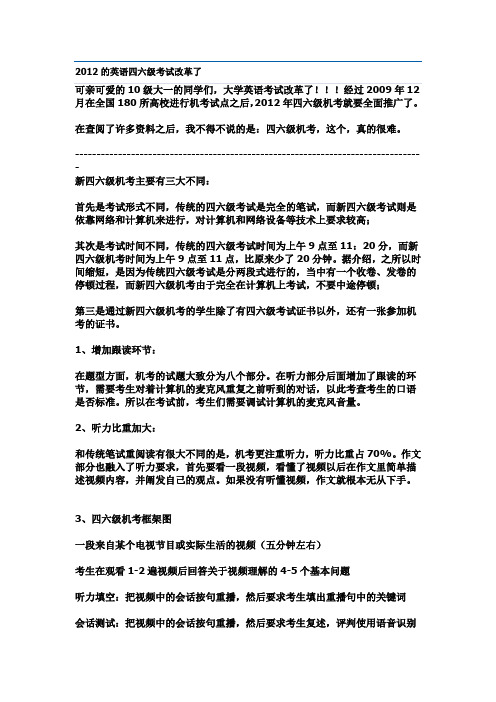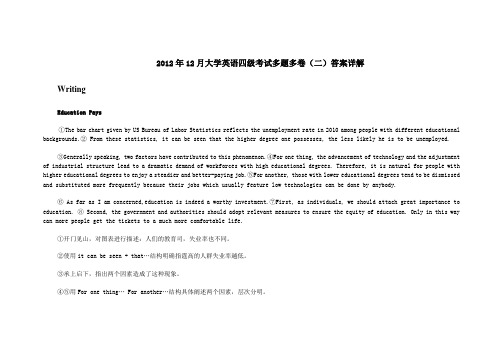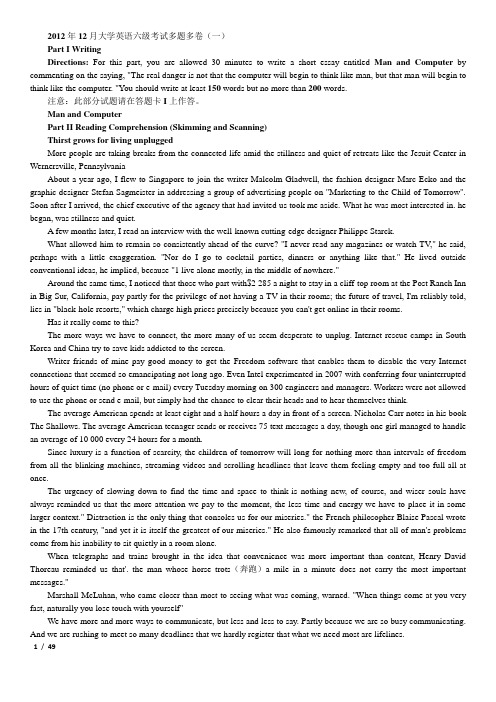2012年12月大学四六级考试考试政策_大学四六级考试将首次实行“多题多卷”[转载]
2013年12月英语四六级考试改革

电梯奇遇如此照相是个与矮墙自2013年12月起,全国大学英语四、六级考试委员会将对四、六级考试的试卷结构和测试题型作局部调整。
调整后,四级和六级的试卷结构和测试题型相同。
一、试卷描述四级和六级的试卷结构、测试内容、测试题型、分值比例和考试时间如下表所示:二、新题型说明1. 写作要求不变,增加通知的写作方法。
本题改革前难度系数0.82,改革后难度系数0.83.2、听力单选题听力单选题难度下降,去掉推断题,加入细节分析题考察,淡化经济学,强化文化领域,四级语速不变,六级听力语速下降为原来的90%。
本题改革前难度系数0.85,改革后难度系数0.783、复合式听写原复合式听写调整为单词及词组听写,短文长度及难度不变。
要求考生在听懂短文的基础上,用所听到的原文填写空缺的单词或词组,共10题。
短文播放三遍。
本题改革前难度系数0.97,改革后难度系数下降为0.72.4、 长篇阅读原快速阅读理解调整为长篇阅读理解,篇章长度和难度不变。
篇章后附有10个句子,每句一题。
每句所含的信息出自篇章的某一段落,要求考生找出与每句所含信息相匹配的段落。
有的段落可能对应两题,有的段落可能不对应任何一题。
改革前快速阅读题目难度系数0.75,改革后本题难度系数0.90. 试卷结构测试内容 测试题型 分值比例 考试时间 写作 写作短文写作 15% 30分钟 听力理解听力对话短对话 多项选择 8% 30分钟 长对话 多项选择 7% 听力短文短文理解 多项选择 10% 短文听写 单词及词组听写 10% 阅读理解词汇理解选词填空 5% 40分钟 长篇阅读 匹配 10% 仔细阅读 多项选择 20% 翻译汉译英 段落翻译 15% 30分钟 总计 100% 130分钟5、翻译原单句汉译英调整为段落汉译英。
翻译内容由校园、经济、艺术学改为校园、金融、儒学、政治经济学、中国近代历史、世界遗产、西方文化、经济学原理、社会发展学、遗传学、进化论。
四级长度为140-160个汉字;六级长度为180-200个汉字。
2012的英语四六级考试改革

2012的英语四六级考试改革了可亲可爱的10级大一的同学们,大学英语考试改革了!!!经过2009年12月在全国180所高校进行机考试点之后,2012年四六级机考就要全面推广了。
在查阅了许多资料之后,我不得不说的是:四六级机考,这个,真的很难。
---------------------------------------------------------------------------------新四六级机考主要有三大不同:首先是考试形式不同,传统的四六级考试是完全的笔试,而新四六级考试则是依靠网络和计算机来进行,对计算机和网络设备等技术上要求较高;其次是考试时间不同,传统的四六级考试时间为上午9点至11:20分,而新四六级机考时间为上午9点至11点,比原来少了20分钟。
据介绍,之所以时间缩短,是因为传统四六级考试是分两段式进行的,当中有一个收卷、发卷的停顿过程,而新四六级机考由于完全在计算机上考试,不要中途停顿;第三是通过新四六级机考的学生除了有四六级考试证书以外,还有一张参加机考的证书。
1、增加跟读环节:在题型方面,机考的试题大致分为八个部分。
在听力部分后面增加了跟读的环节,需要考生对着计算机的麦克风重复之前听到的对话,以此考查考生的口语是否标准。
所以在考试前,考生们需要调试计算机的麦克风音量。
2、听力比重加大:和传统笔试重阅读有很大不同的是,机考更注重听力,听力比重占70%。
作文部分也融入了听力要求,首先要看一段视频,看懂了视频以后在作文里简单描述视频内容,并阐发自己的观点。
如果没有听懂视频,作文就根本无从下手。
3、四六级机考框架图一段来自某个电视节目或实际生活的视频(五分钟左右)考生在观看1-2遍视频后回答关于视频理解的4-5个基本问题听力填空:把视频中的会话按句重播,然后要求考生填出重播句中的关键词会话测试:把视频中的会话按句重播,然后要求考生复述,评判使用语音识别阅读测试:一篇或两篇短文语法测试:以视频和阅读材料为基础,回答语法问题翻译测试:以视频和阅读材料为基础,完成翻译写作测试:以视频和阅读材料为基础,完成命题作文CET4题型分为两大类,与听力相关的题型分值占70%,阅读理解占30%。
四六级考试周末开考 考生关注七大热点问题解读

四六级考试周末开考考生关注七大热点问题解读内容由京翰教育一对一家教辅导()整理2012下半年全国大学英语四、六级考试将于12月22日举行,广大考生们经过长期的复习准备,将在这个周末通过真刀真枪的检验,考试前夕,针对考生关注的:四六级命题方向、“多题多卷”、考前状态调整、应考策略等热点问题,资深辅导专家来解释。
问:综合近几年的考试题,四六级的题型及命题方向有什么变化?关键字:难度会继续加强京翰老师回答:四、六级考试最大的改革出现在2006年6月24日,这次考试的试卷结构最终成为这六年考试的模板。
其中听力增加至35%,阅读减少至35%,词汇和语法题目停考,都是比较重要的改变。
不过在之后的考试中,考试的形式和各个科目的比例再也没有发生过变化。
不过最近几年中,四、六级考试的各种小变化,值得考生注意,例如:第一、听力部分的语言长度增加,速度加快,更多海外生活和学习场景出现在题目中,而听力原文改动的痕迹也越来越小。
第二、阅读和完形填空的原文更多的来自于美国和英国的报刊杂志。
时代周刊和卫报是被选择次数较多的题源,而且文章难度也在增加。
第三、六级写作在2012年6月出现全英文写作提纲,让很多考生措手不及。
以上的变化都说明,四、六级考试的语言准度愈加向本土英文考试靠拢,并特别强调考生实际语言能力的应用。
对于今年的考试,我们预测,结构、比例及题型不会有任何变化,但是题目本身的难度会继续加强。
问:怎么看多题多卷这一变革?对此给考生什么建议?关键字:防作弊注意区分试卷京翰老师回答:“多题多卷”指在同一考场内采用内容不同的试题组成的多套试卷实施考试。
多套试卷之间的难度差异对考生成绩产生的影响将通过试卷之间的等值计算来处理,因此考生的成绩不会因其所京翰老师回答试卷的难度差异而受影响。
四六级考试委员会之所以这样做,主要是为了控制全国屡禁不止的作弊行为,净化考场环境,保证考试公平。
针对此次改革,我们建议学员一定要遵守考场纪律,严格按照考场指令完成考试,不要忘记用贴条码的方式来区分试卷。
2012年12月大学英语四级考试多题多卷(二)答案详解

2012年12月大学英语四级考试多题多卷(二)答案详解WritingEducation Pays①The bar chart given by US Bureau of Labor Statistics reflects the unemployment rate in 2010 among people with different educational backgrounds.② From these statistics, it can be seen that the higher degree one possesses, the less likely he is to be unemployed.③Generally speaking, two factors have contributed to this phenomenon.④For one thing, the advancement of technology and the adjustment of industrial structure lead to a dramatic demand of workforces with high educational degrees. Therefore, it is natural for people with higher educational degrees to enjoy a steadier and better-paying job.⑤For another, those with lower educational degrees tend to be dismissed and substituted more frequently because their jobs which usually feature low technologies can be done by anybody.⑥ As far as I am concerned,education is indeed a worthy investment.⑦First, as individuals, we should attach great importance to education. ⑧ Second, the government and authorities should adopt relevant measures to ensure the equity of education. Only in this way can more people get the tickets to a much more comfortable life.①开门见山,对图表进行描述:人们的教育司,失业率也不同。
英语四六级大改革,新四六级考试注意事项大全

[转] 2012.12.22英语四六级大改革,新四六级考试注意事项大全【含全套备考资料及押题作文万能句】2012年12月22日,迎来了第三次全国四六级大改革,全国统一首用“多题多卷”形式。
参加本月22号四六级考试的童鞋们注意了:本次考试首次实行“多题多卷”的考试形式,即在同一考场内使用多套试卷进行考试,每一套试卷的题目内容都不一样,是真正意义上的“多卷”。
跟以往采用一套试题, 仅通过题目顺序变化实现“多卷”有所不同。
考试时考生除按原有要求填(涂)答题卡上相关内容外,还须讲试题册封底上的条形码揭下,粘贴在答题卡二的相应框内,而且考生要在试题册封底指定位置填写姓名和准考证号,任何一个环节有误整个试卷作废。
下面有还有一些小误区,需要嘱咐:1. 英语四六级考试作文没有草稿纸,不能打草稿,必须直接写,平常模拟的时候习惯打草稿的同学,请尽快改掉这个习惯。
2. 英语四六级考试作文和快速阅读是限时的,先发作文答题纸(即答题卡一),作文限时是30分钟,这期间你是看不到其他题目的,所以作文写太快是没有用的,写完你也不能干别的!所以考试总时间125分钟有30分钟是作文,剩余时间就很少了,不容乐观。
3. 作文限时30分钟,但是25分钟的时候就发快速阅读的题了,只不过这个时候不允许翻看,作文限时结束后打铃或者老师口头宣布可以答快速阅读了,这个时候作文卡是不收回的,因为快速阅读的答案要涂在答题卡一上面,与作文共用答题卡,也就是说作文没有写完的你可以继续写,但是快速阅读限时15分钟结束要立即收卷,那么长的阅读15分钟是很难答完的,所以建议绝对不要占用快速阅读的时间写作文,十分不值得!作文尽量在25分钟内写完。
4. 听力卷纸与快速阅读在一起,播放听力之前有试音时间和发答题卡二的时间(听力答题卡与之前不是一张卡,之前的答题卡一已经收走了),所以你有足够的时间读题,和你们说这个是因为好多人答模拟题的时候都是利用录音中度direction的时间看题,考试的时候多了一些时间却不知道怎么利用了,这个时候要全力集中看题!都读一遍也是时间足够的,但是要全力集中!这是决定听力胜败的命脉时刻!!很多人一直在关心四六级到底如何算成绩,其实,四六级考试可不是百分制的考试,很多人正是不了解评分的方法、批卷的潜规则,才一次又一次被分数背后的奥秘所迷惑,白瞎了很多的努力,又是一年四六级出分季,有人欢喜有人忧,那就让我们看一看四六级批卷和评分的奥秘,并看看到底如何准备英语四六级才最有效率。
2012年12月 真题与答案 多题多卷

2012年12月大学英语六级考试多题多卷(一)Part I WritingDirections: For this part, you are allowed 30 minutes to write a short essay entitled Man and Computer by commenting on the saying, "The real danger is not that the computer will begin to think like man, but that man will begin to think like the computer. "You should write at least 150 words but no more than 200 words.注意:此部分试题请在答题卡I上作答。
Man and ComputerPart II Reading Comprehension (Skimming and Scanning)Thirst grows for living unpluggedMore people are taking breaks from the connected life amid the stillness and quiet of retreats like the Jesuit Center in Wernersville, PennsylvaniaAbout a year ago, I flew to Singapore to join the writer Malcolm Gladwell, the fashion designer Marc Ecko and the graphic designer Stefan Sagmeister in addressing a group of advertising people on "Marketing to the Child of Tomorrow". Soon after I arrived, the chief executive of the agency that had invited us took me aside. What he was most interested in. he began, was stillness and quiet.A few months later, I read an interview with the well-known cutting-edge designer Philippe Starck.What allowed him to remain so consistently ahead of the curve? "I never read any magazines or watch TV," he said, perhaps with a little exaggeration. "Nor do I go to cocktail parties, dinners or anything like that." He lived outside conventional ideas, he implied, because "1 live alone mostly, in the middle of nowhere."Around the same time, I noticed that those who part with$2 285 a night to stay in a cliff-top room at the Post Ranch Inn in Big Sur, California, pay partly for the privilege of not having a TV in their rooms; the future of travel, I'm reliably told, lies in "black-hole resorts," which charge high prices precisely because you can't get online in their rooms.Has it really come to this?The more ways we have to connect, the more many of us seem desperate to unplug. Internet rescue camps in South Korea and China try to save kids addicted to the screen.Writer friends of mine pay good money to get the Freedom software that enables them to disable the very Internet connections that seemed so emancipating not long ago. Even Intel experimented in 2007 with conferring four uninterrupted hours of quiet time (no phone or e-mail) every Tuesday morning on 300 engineers and managers. Workers were not allowed to use the phone or send e-mail, but simply had the chance to clear their heads and to hear themselves think.The average American spends at least eight and a half hours a day in front of a screen. Nicholas Carr notes in his book The Shallows. The average American teenager sends or receives 75 text messages a day, though one girl managed to handle an average of 10 000 every 24 hours for a month.Since luxury is a function of scarcity, the children of tomorrow will long for nothing more than intervals of freedom from all the blinking machines, streaming videos and scrolling headlines that leave them feeling empty and too full all at once.The urgency of slowing down-to find the time and space to think-is nothing new, of course, and wiser souls have always reminded us that the more attention we pay to the moment, the less time and energy we have to place it in some larger context." Distraction is the only thing that consoles us for our miseries." the French philosopher Blaise Pascal wrote in the 17th century, "and yet it is itself the greatest of our miseries." He also famously remarked that all of man's problems come from his inability to sit quietly in a room alone.When telegraphs and trains brought in the idea that convenience was more important than content, Henry David Thoreau reminded us that'. the man whose horse trots(奔跑)a mile in a minute does not carry the most important messages."Marshall McLuhan, who came closer than most to seeing what was coming, warned. "When things come at you very fast, naturally you lose touch with yourself"We have more and more ways to communicate, but less and less to say. Partly because we are so busy communicating. And we are rushing to meet so many deadlines that we hardly register that what we need most are lifelines.So what to do? More and more people I know seem to be turning to yoga, or meditation(沉思),or tai chi(太极);these aren't New Age fads(时尚的事物)so much as ways to connect with what could be called the wisdom of old age. Two friends of mine observe an "Internet sabbath(安息日)"every week, turning off their online connections from Friday night to Monday morning. Other friends take walks and "forget" their cellphones at home.A series of tests in recent years has shown. Mr. Carr points out, that after spending time in quiet rural settings, subjects "exhibit greater attentiveness, stronger memory and generally improved cognition. Their brains become both calmer and sharper." More than that, empathy(同感,共鸣),as well as deep thought. depends (as neuroscientists like二Antonio Damasio have found) on neural processes that are 'inherently slow."I turn to eccentric measures to try to keep my mind sober and ensure that I have time to do nothing at all (which is the only time when I can see what I should be doing the rest of the time).I have yet to use a cellphone and I have never Tweeted or entered Facebook. I trynot to go online till my day's writing is finished, and I moved from Manhattan to rural Japan in part so I could more easily survive for long stretches entirely on foot.None of this is a matter of asceticism(苦行主义);it is just pure selfishness. Nothing makes me feel better than being in one place, absorbed in a book. a conversation, or music. It is actually something deeper than mere happiness: it is joy. which the monk(僧侣)David Steindl-Rast describes as "that kind of happiness that doesn't depend on what happens."It is vital, of course, to stay in touch with the world. But it is only by having some distance from the world that you can see it whole, and understand what you should be doing with it.For more than 20 years. therefore, I have been going several times a year-often for no longer than three days- to a Benedictine hermitage(修道院),40 minutes down the road, as it happens, from the Post Ranch Inn. I don't attend services when I am there, and 1 have never meditated, there or anywhere; I just take walks and read and lose myself in the stillness, recalling that it is only by stepping briefly away from my wife and bosses and friends that I will have anything useful to bring to them. The last time 1 was in the hermitage, three months ago. I happened to meet with a youngish-looking man with a 3-year-old boy around his shoulders."You're Pico aren't you?" the man said, and introduced himself as Larry; we had met, 1 gathered, 19 years before, when he had been living in the hermitage as an assistant to one of the monks."What are you doing now?" I asked.We smiled. No words were necessary."I try to bring my kids here as often as I can," he went on. The child of tomorrow, I realized, may actually be ahead of us, in terms of sensing not what is new, but what is essential.注意:此部分试题请在答题卡I上作答。
2012年12月大学英语六级考试多题多卷(三)

正保远程教育旗下品牌网站美国纽交所上市公司(NYSE:DL)外语教育网外语学习的网上乐园2012年12月大学英语六级考试多题多卷(三)Part I Writing内容同2012年12月大学英语六级考试多题多卷(一)Directions:For this part, you are allowed 30 minutes to write a short essay entitled Man and Computer by commenting on the saying, "The real danger is not that the computer will begin to think like man, but that man will begin to think like the computer. "You should write at least 150 words but no more than 200 words.注意:此部分试题请在答题卡I上作答。
Man and Computer_______________________________________________________________________________________________ _______________________________________________________________________________________________Part II Reading Comprehension (Skimming and Scanning)Directions: In this part, you will have 15 minutes to go over the passage quickly and answer the questions on Answer Sheet 1. For questions 1-7, choose the best answer from the four choices marked A),B),C) and D).For questions 8-10, complete the sentences with the information given in the passage.In a Digital Age, Students Still Cling to Paper TextbooksThey text their friends all day long. At night, they do research for their term papers on laptops and commune with their parents on Skype. But as they walk the paths of Hamilton College, a poster-perfect liberal arts school in this upstate village, students are still hauling around bulky, old-fashioned textbooks-and loving it."The screen won't go blank," said Faton Begolli, a junior from Boston. "There can't be a virus. It wouldn't be the same without books. They've defined 'academia' (学术) for a thousand years."Though the world of print is receding before a tide of digital books, blogs and other Web sites, a generation of college students growing up with technology appears to be holding fast to traditional textbooks. That loyalty comes at a price. Textbooks are expensive-a year's worth can cost$700 to$900-and students' frustrations with the expense, as well as the emergence of new technology, have produced a perplexing array of options for obtaining them.Internet retailers like Amazon and are selling new and used books. They have been joined by several Web services that rent textbooks to students by the semester. Some 1 500 college bookstores are also offering rentals this fall, up from 300 last year. Here at Hamilton, students this year have a new way to avoid the middleman: a nonprofit Web site, created by the college's Entrepreneur Club, that lets them sell used books directly to one another.The explosion of outlets and formats-including digital books, which are rapidly becoming more sophisticated- has left some students bewildered. After completing the difficult job of course selection, they are forced to weigh cost versus convenience, analyze their own study habits and guess which texts they will want for years to come and which they will not miss."It depends on the course," said Victoria Adesoba, a student at New York University who was standing outside that school's bookstore, a powder-blue book bag slung over her shoulder “Last semester, I rented for psychology, and it was cheaper. But for something like organic chemistry, I need to keep the book. E-textbooks are good, but it's tempting to go on Facebook, and it can strain your eyes."。
浅谈如何应对2013年12月四六级考试改革

t计
( 二) 新 题 型 说 明
1 . 单 词 及 词 组 听 写
听力单选题难度 下降 , 去掉 推 断题 , 加 入细 节分 析题 考 察 , 淡 化 经济 学, 强化文化领域。原复合式 听写调 整为单 词及 词组 听写 , 短 文长度 及难 度不变。要求考生在听懂短文的基础上 , 用所 听到 的原 文填写空缺 的单词 或词组 , 共l O题。短文播放三遍。四级语速不 变, 六级听 力语 速下 降为原 来的 9 0 %。本题改革前难度系数为 0 . 8 5 . 改革后难度 系数为 0 . 7 8 。
型 的 改革 主要 集 中在 听 力 、 阅读 、 翻 译 上 。 下 面 就 是 从 这 三 方 面 给 同 学 们 提一些建议 。 听 力: 想 要 提 高 听 力 就 练 听 写 。 利 用 空 余 时 间 多 练 练 听 力 。 平 常 需 要
持 骨
m
演薅麓
疆蔫 ● l 滞
写难 度 降 低 , 不 用 听 写 长 句 了。 但 是 需 要 对 词 组 的 连 音 、 失 去 爆 破 特 别
重视。
原快速阅读理解调整为长篇阅读理解 , 篇章长度和难 度不 变。篇 章后 附有 l O个句子 , 每句一题 。每句所含的信息 出自篇章 的某 一段落 , 要 求考 生找出与每句所含信息相 匹配的段落。有 的段 落可能对应 两题 , 有 的段落 可能不对应任何一题。改革前快速阅读题 目难度系数为 0 . 7 5。 改革后 本题
以, 同学们多做阅读很大部分原 因是为 了让更快 地熟 悉英美思 维方式 。 培
原单句汉译英调整为段落 汉译 英。翻译 内容 由校 园、 经济 、 艺术 学改
为校园、 金融、 儒学、 政治经济学、 中国近代历史 、 世界遗产 、 西 方文化 、 经 济
- 1、下载文档前请自行甄别文档内容的完整性,平台不提供额外的编辑、内容补充、找答案等附加服务。
- 2、"仅部分预览"的文档,不可在线预览部分如存在完整性等问题,可反馈申请退款(可完整预览的文档不适用该条件!)。
- 3、如文档侵犯您的权益,请联系客服反馈,我们会尽快为您处理(人工客服工作时间:9:00-18:30)。
大学四六级考试将首次实行“多题多卷”
2012-12-18 16:55:02 大学英语四、六级考试委员会办公室
全国大学英语四、六级考试自2012年12月考试开始将采用“多题多卷”模式实施考试。
“多题多卷”指在同一考场内采用内容不同的试题组成的多套试卷实施考试。
多套试卷之间的难度差异对考生成绩产生的影响将通过试卷之间的等值计算来处理,因此考生的成绩不会因其所答试卷的难度差异而受影响。
采用“多题多卷”模式后,考生在正式开始作答前,除按以往要求正确填写(涂)答题卡1和答题卡2上的准考证号、姓名等信息外,还须将试题册背面的条形码粘贴条揭下后粘贴至答题卡2左上角的条形码粘贴框内,并正确填写试题册背面的准考证号和姓名。
全国大学英语四、六级考试委员会办公室。
